
📢 #CallForPapers - 2nd Workshop on Frontiers in Measurement and Survey Methods
Organised by: CEPR, University of Calabria, University of Naples Federico II & @yale.edu
Deadline: 25 Jan 2026
More details: cepr.org/events/works...
@giannolamichele.bsky.social @armiano.bsky.social
17.11.2025 15:52 —
👍 2
🔁 3
💬 0
📌 0

NEW: #IFSWorkingPaper: The rise of online dating and heterogamous marriages
📗 Read Yujung Hwang, Fangzhu Yang and @paulaaureo.bsky.social's new paper on how the diffusion of online dating platforms has shaped intermarriage patterns by race and education here: ifs.org.uk/publications...
17.09.2025 11:42 —
👍 3
🔁 1
💬 0
📌 0

Just published in @jpube.bsky.social:
"Intergenerational mobility in socio-emotional skills"
By Orazio P. Attanasio, @paulaaureo.bsky.social, & Alessandro Toppeta
www.sciencedirect.com/science/arti...
#econsky #publiceconomics
@ucleconomics.bsky.social @uclpolicylab.bsky.social
@sofi.su.se
13.08.2025 18:16 —
👍 25
🔁 5
💬 1
📌 0
If this seems interesting to you, check our paper or NotebookLM podcast below!
https://www.sciencedirect.com/science/article/pii/S0047272725001215?via%3Dihub
https://notebooklm.google.com/notebook/6c466a86-a8b3-42f3-b7ab-9e5718596ac1/audio
(7/7)
14.07.2025 11:05 —
👍 1
🔁 0
💬 0
📌 0

We do much more in the article! For example, we look at further measures of association and discuss our estimation protocol in detail – importantly, both skills and intergenerational regressions are estimated jointly. (6/7)
14.07.2025 11:05 —
👍 0
🔁 0
💬 1
📌 0
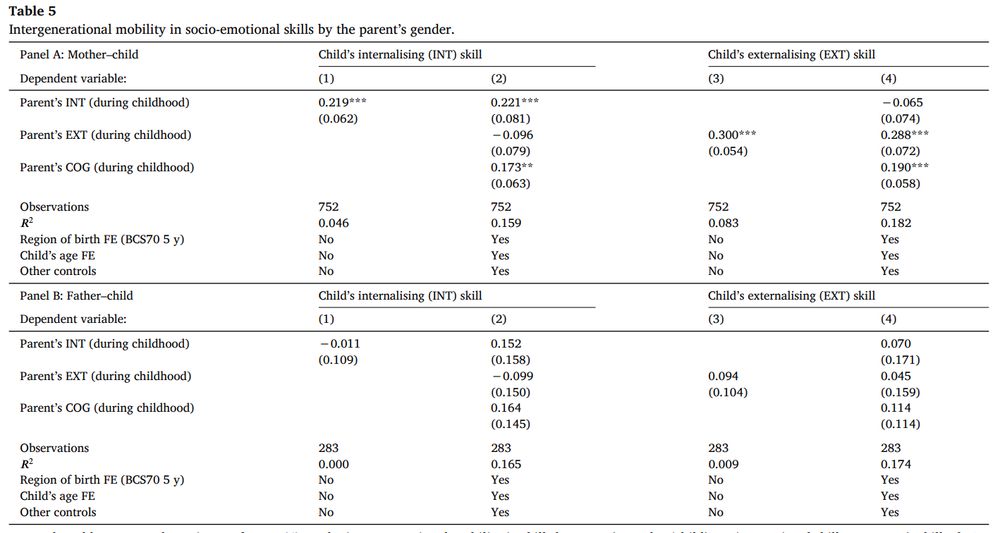
Interestingly, we also find that mother-child correlations are much higher than father-child! (This relationship remains even after robustness checks for alternative explanations such as different sample sizes.) (5/7)
14.07.2025 11:05 —
👍 0
🔁 0
💬 1
📌 0
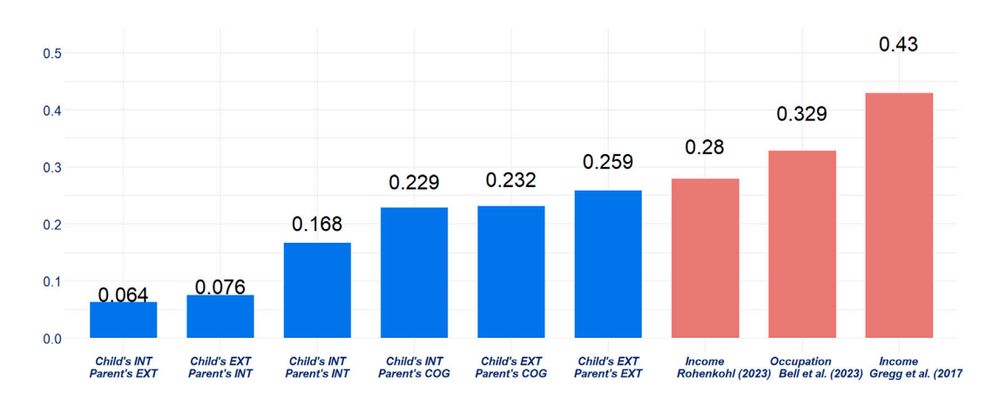
This allows us to measure skills at the same age for parents and children. While correlations are lower than those measured contemporaneously and between other economic variables in related studies, they are still sizeable and significant! (4/7)
14.07.2025 11:05 —
👍 0
🔁 0
💬 1
📌 0
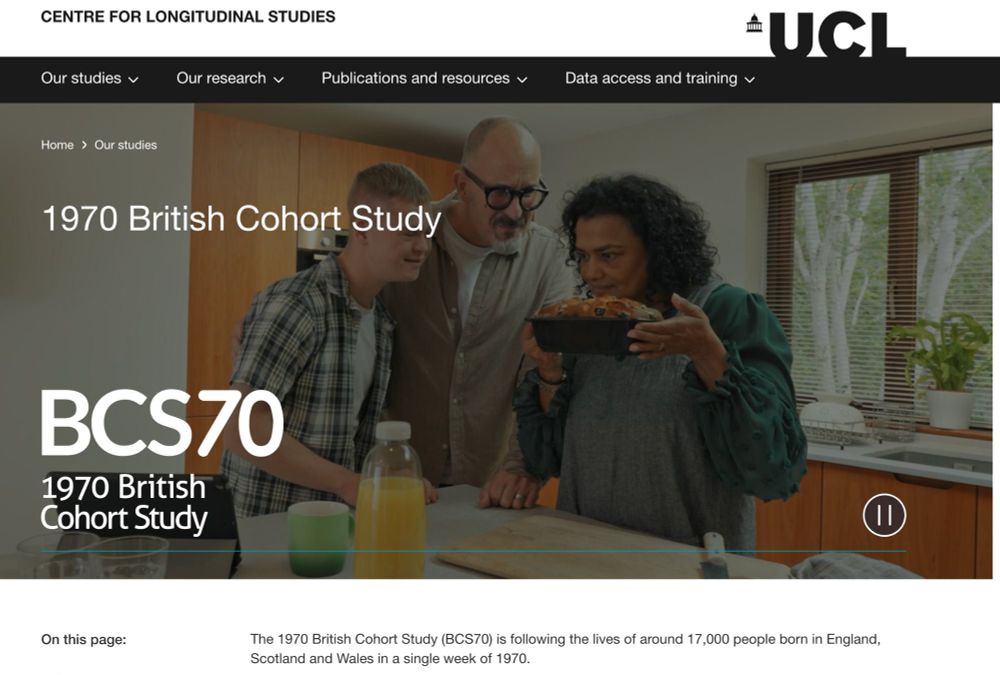
Here, we focus on “internalising” (e.g., focussing drive aothers) skills using the 1970 UK British Cohort Study, which follows all born in the UK on a week in Apr/1970 linking their info w their mums as well as (eventual) kids! (3/7)
14.07.2025 11:05 —
👍 0
🔁 0
💬 1
📌 0
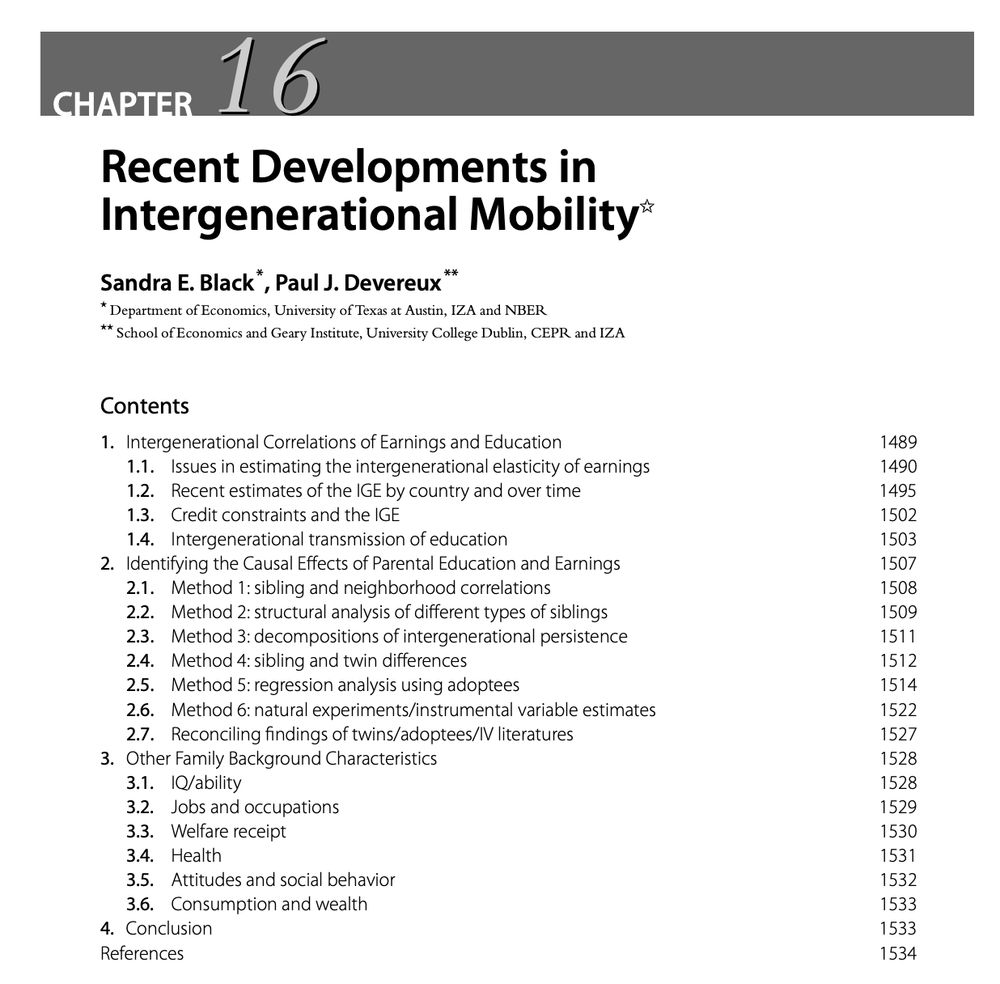

The literature has registered association across several meaningful economic variables and outcomes across generations. Socio-emotional skills are also important! (2/7)
14.07.2025 11:05 —
👍 0
🔁 0
💬 1
📌 0
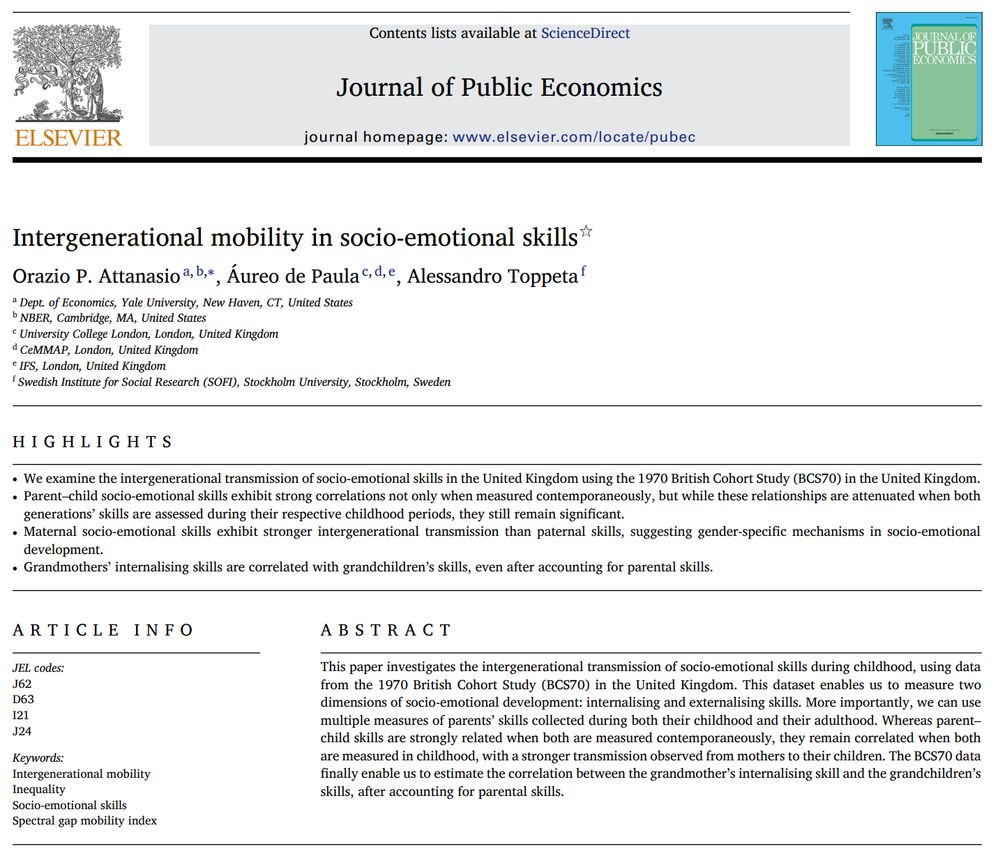
This is a (very) short thread on a recent paper with the great Orazio Attanasio and Alessandro Toppeta on “Intergenerational Mobility in Socio-Emotional Skills” (forthcoming at @jpube.bsky.social)! (1/7)
@ucleconomics.bsky.social @uclpolicylab.bsky.social @sofi.su.se @clscohorts.bsky.social
14.07.2025 11:05 —
👍 9
🔁 1
💬 1
📌 0
📣 Check out my latest article with R Inafuku, T Halliday and Lester Lusher on air population, test scores ...and a volcano!
25.06.2025 23:05 —
👍 5
🔁 0
💬 0
📌 0
Join @ucleconomics.bsky.social this May for this year's annual Gorman Lecture and Conference 2025.
Find out more about this year's programme and book your tickets ⬇️
01.05.2025 14:18 —
👍 3
🔁 2
💬 0
📌 0
We at @ucleconomics.bsky.social have extended the application deadline to our MA degrees by a week (until May 8th)--all nationalities warmly welcome!
29.04.2025 07:33 —
👍 17
🔁 9
💬 0
📌 1
This year's Gorman Lectures at UCL will be given by one of my heroes, Ariel Pakes. I can't wait!
25.04.2025 20:58 —
👍 12
🔁 4
💬 0
📌 0
It's been a while since I did a standard lit review thread, but here's one for #econsky #econtwitter about an important literature that's been growing recently: the effect of supply- and demand-side interventions on fertility in LMICs
11.04.2025 16:49 —
👍 7
🔁 3
💬 1
📌 0
We are recruiting an Econometrics Adviser. The role would suit someone with a recent PhD (or a masters and some experience), and an interest in empirical IO. This is a unique opportunity to work on high-profile cases and with great data!
www.civilservicejobs.service.gov.uk/csr/jobs.cgi...
21.02.2025 11:01 —
👍 10
🔁 6
💬 0
📌 1
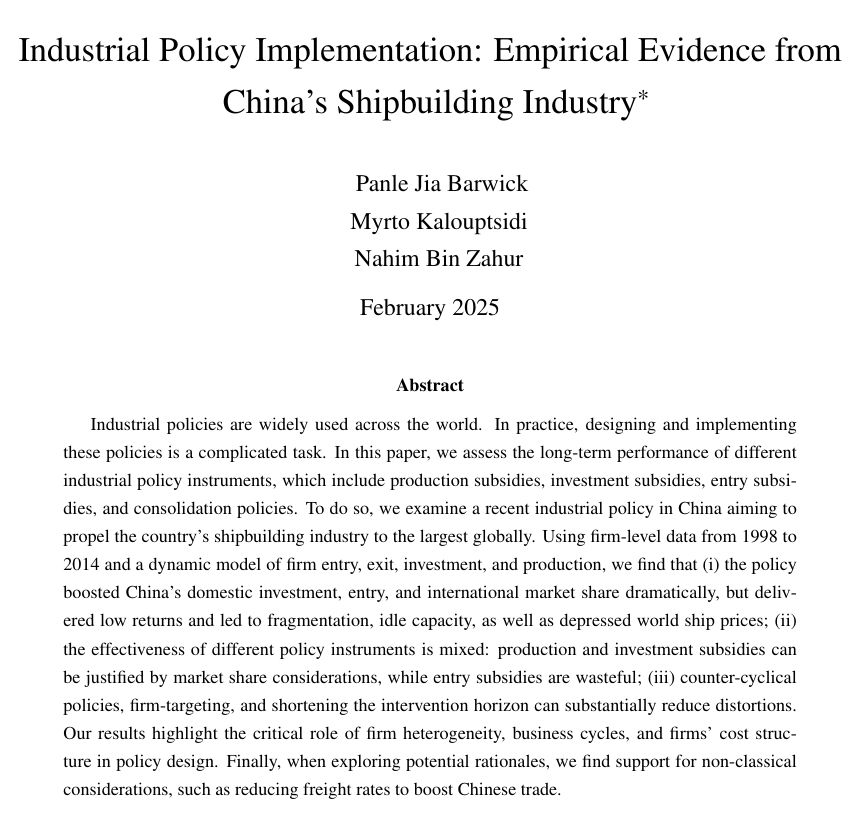
Recently accepted to @reveconstudies.bsky.social, "Industrial Policy Implementation: Empirical Evidence from China’s Shipbuilding Industry" from Barwick, Kalouptsidi and Bin Zahur:
www.restud.com/industrial-p...
18.02.2025 11:37 —
👍 21
🔁 8
💬 1
📌 1
We offer simulations and an application using data from the Current Population Survey. If this sounds interesting to you, make sure to check the article! (5/5)
https://arxiv.org/abs/2501.10117
10.02.2025 12:50 —
👍 4
🔁 0
💬 0
📌 0
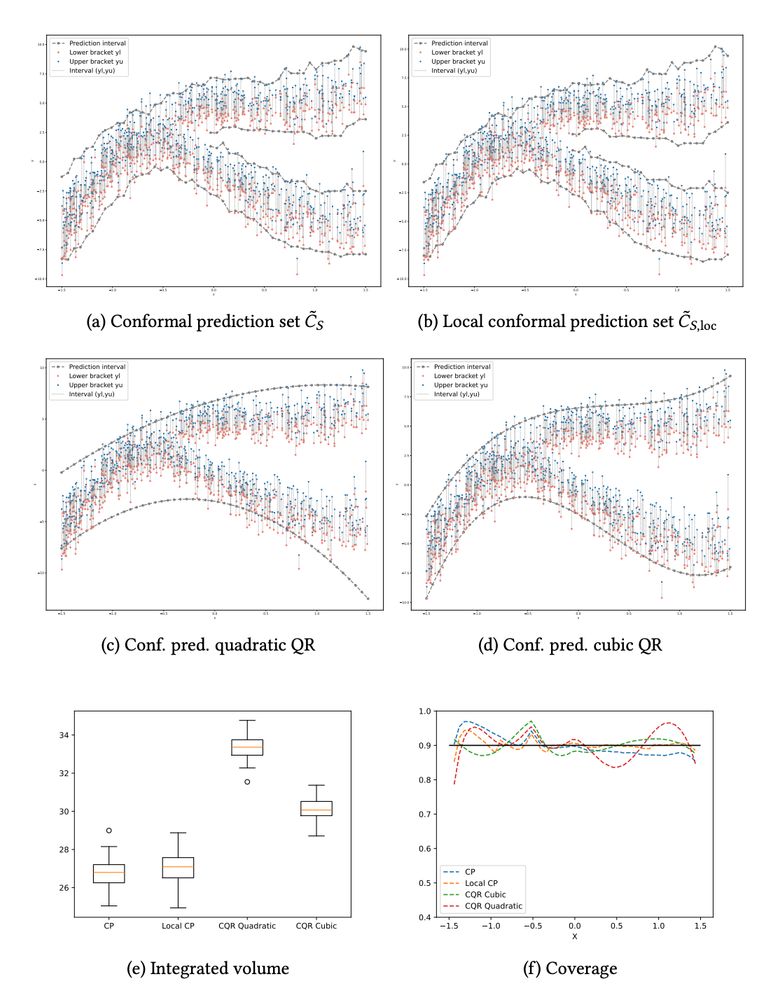
To employ conformal inference, we construct a conformity score function which accounts for the set-valued nature of the outcomes of interest. The procedure accommodates (irreducible) prediction uncertainty, modelling uncertainty due to partial identification and sampling uncertainty. (4/5)
10.02.2025 12:50 —
👍 3
🔁 1
💬 1
📌 0

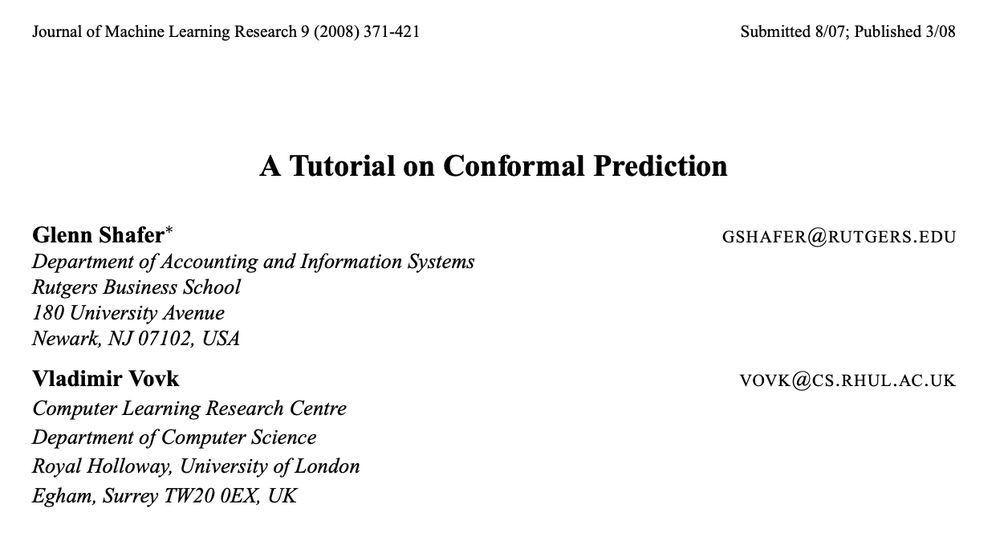
To do so we first characterise the shortest prediction interval (or set, more broadly!) in such cases. We then employ “conformal inference” to construct prediction sets with particular finite sample guarantees under censoring while maintaining consistency as the sample size grows. (3/5)
10.02.2025 12:50 —
👍 2
🔁 0
💬 1
📌 0

Interval data is pervasive. Surveys usually employ “bracketing” to avoid item nonresponse. Censoring is also present in many contexts. Here, we offer a prediction protocol for outcomes that are interval-valued! (2/5)
10.02.2025 12:50 —
👍 1
🔁 0
💬 1
📌 0
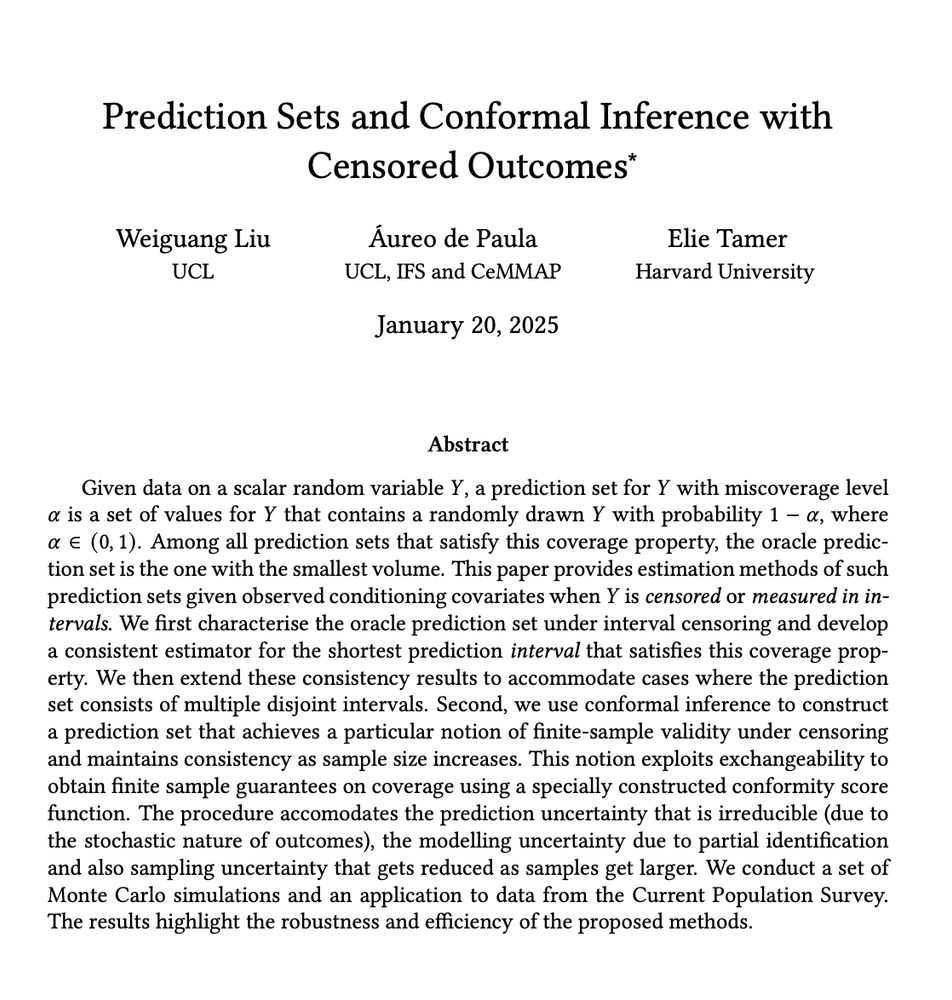
I have a new paper on “Prediction Sets and Conformal Inference with Censored Outcomes” with the great Weiguang Liu and Elie Tamer. Prediction Sets and Conformal… what? I know, I know! Here comes a (very) short thread on what we do in the paper. (1/5)
10.02.2025 12:50 —
👍 24
🔁 5
💬 1
📌 1
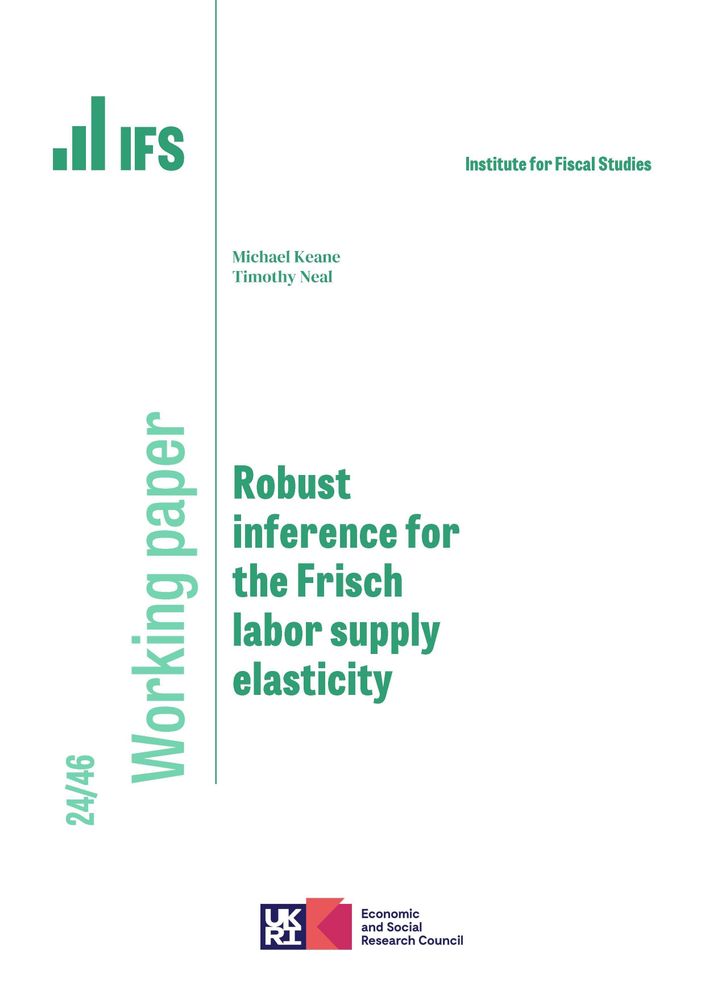
NEW #IFSWorkingPaper: Robust inference for the Frisch labor supply
Michael Keane and Timothy Neal argue the AR test should be widely adopted in lieu of the 2SLS t-test for estimating Frisch labor supply elasticity.
Read here: https://buff.ly/4fhBJ2G
23.10.2024 16:14 —
👍 2
🔁 1
💬 0
📌 0
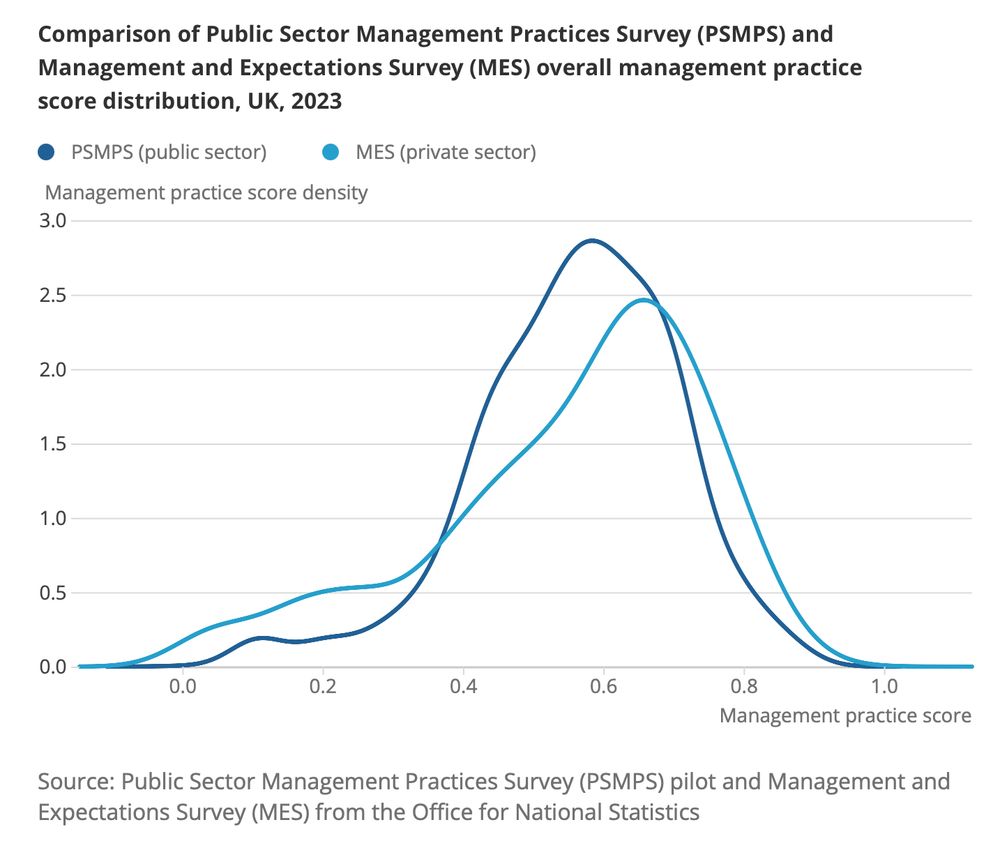
The ONS has today released results from two new data collection efforts on public-sector productivity: a public-sector version of the existing Management and Expectations Survey and a public-sector time use survey.
Overall, management practices look similar in the public and private sectors.
1/
21.10.2024 19:42 —
👍 7
🔁 4
💬 1
📌 0
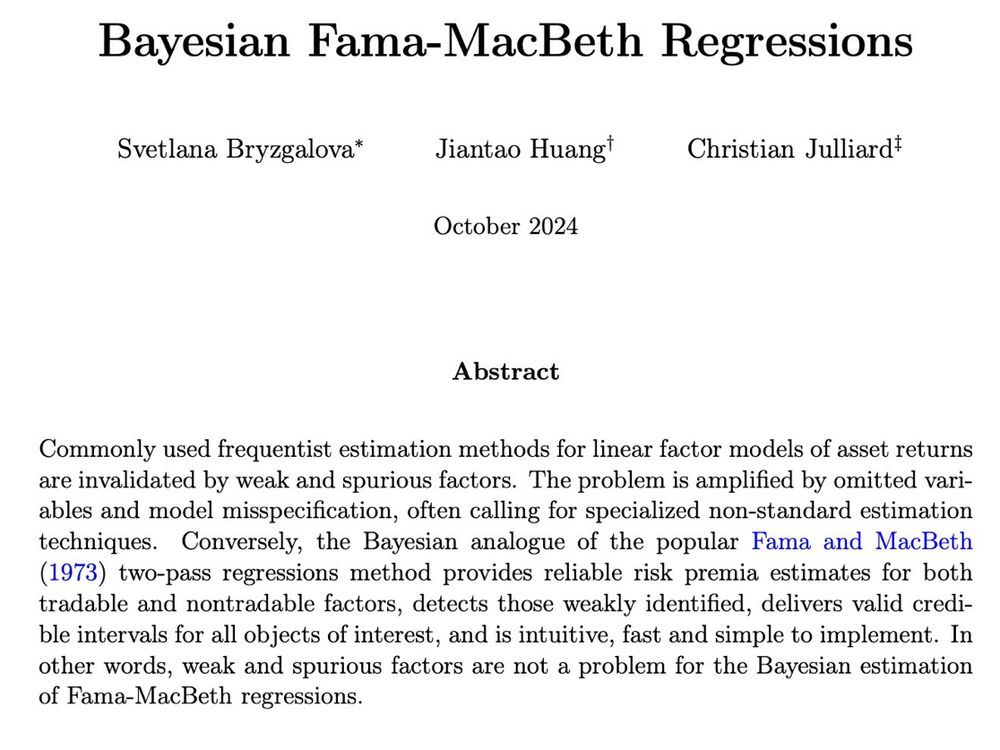
🚨New (very short) paper alert:
"Bayesian Fama-MacBeth Regressions" with @SBryzgalova and Jiantao Huang tinyurl.com/bddpezz6
🧵1/n #Finance #Econometrics
19.10.2024 11:45 —
👍 13
🔁 3
💬 4
📌 1
This is very much in the same spirit as the (more abstract) discussion in Rothenberg ("Identification in Parametric Models", Econometrica, 1971).
17.10.2024 00:28 —
👍 0
🔁 0
💬 0
📌 0
The coeffs in their eq (5) = your eq (4). Notice that their results establish that two diff par vectors will imply diff coeffs in that eq. The proof goes: "Consider two sets of structural parameters (α, β, γ , δ) and (α′, β′, γ ′, δ′) leading to the same reduced form..." to get a contradiction.
17.10.2024 00:27 —
👍 0
🔁 0
💬 2
📌 0
One other observation that occurs to me is that the identification result in Bramoulle, Djebbari and Fortin departs from the "reduced form" parameter. I suspect your result might relate to the (non-)identification of that parameter.
16.10.2024 23:48 —
👍 1
🔁 0
💬 1
📌 0
Thanks, Alex! I guess this would depend on the context. (In a panel setting as in Besley and Case (AER, 1995) or here: academic.oup.com/restud/advan... this would appear less troublesome to me.)
16.10.2024 23:46 —
👍 1
🔁 0
💬 1
📌 0



















